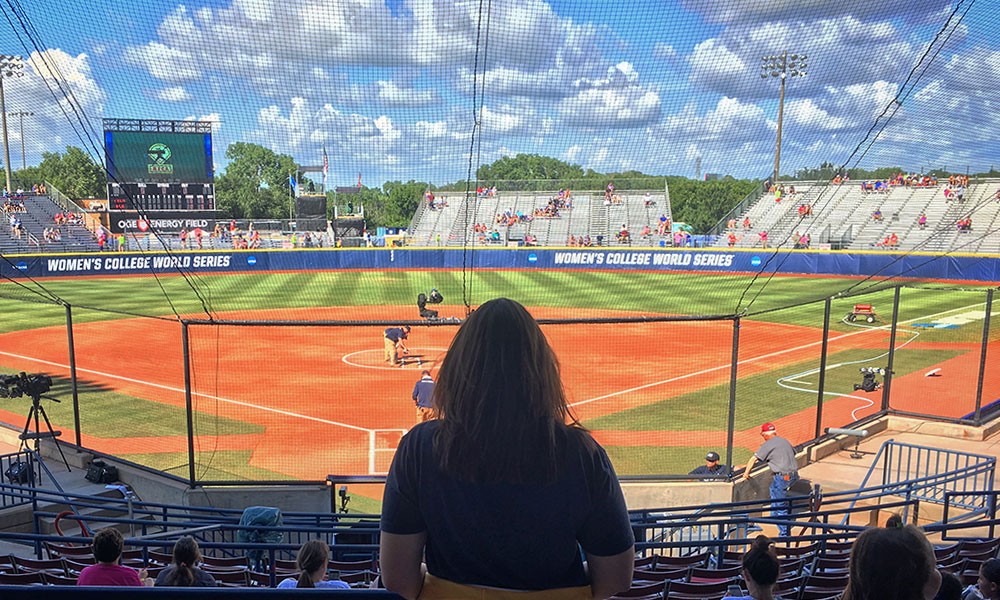Opinion: NCAA Softball 2017 The Good, Bad and Ugly, Part II

In part one we looked at the rules, but in part II, I take aim at the NCAA itself. Maybe I am an outsider and maybe I am off base, but things did not seem right this year when it came to the “NCAA softball committee” and the selection process. The amount of controversy created by their secret; the undocumented selection process was a black eye and not the way you should kick off the biggest event in the sport.
The NCAA is a “government” in every sense of the word. Like any form of government, it has it’s good and bad aspects. The NCAA states that its “Core Purpose” is to “govern competition in a fair, safe, equitable and sportsmanlike manner, and to integrate intercollegiate athletics into higher education so that the educational experience of the student-athlete is paramount.”
Let’s look at that from the perspective of the selection committee this year. The handling of this year’s seeding was embarrassing, negligent and to be frank, had the feeling of corruption. Strong words, sure, but that is how many felt after the seeds and selections were released. The whole process this season did not seem to align at all with their own self-stated “Core Purpose”.
I have spoken with many people who seem to be equally baffled at what happened and that also wonder if there is some level of collusion going on. The NCAA generated $995.6 million dollars in revenue in 2016. The one thing they are certainly good at is making money. This season, many things seemed to be “Pro-SEC”. ESPN has the rights to the NCAA Tournament, ESPN owns the SEC Network, all 13 SEC teams made the tournament and eight of them were seeded in the top 16, assuring they host at least one week. That is not evidence of anything fishy going on, but it at least makes you wonder. I am not saying that it is a grand conspiracy, but I am saying that it seems a bit odd. It was also fairly clear during the broadcasts of the entire NCAA tournament that the SEC was on the forefront of announcers minds.
The range of reasons as to why Minnesota was not seeded is interesting. “They had a weak schedule”. Yet they moved up the RPI after winning their second straight Big 10 tournament. The RPI does factor in strength of schedule. The excuse Minnesota played a weak schedule because of their conference is interesting, since the same committee put five Big 10 teams in the tournament, tied for second most with the Pac 12. “Their stadium is too small”. Really? Look back up at the “Core Purpose” of the NCAA. Pretty sure that does not fit with their own mission.
Let’s be honest, there is not a legitimate argument to be made as to why Minnesota was not seeded in the top 16, period. Then you hear, “well they got it right all 16 teams advanced”. Come on, allowing teams to host and not have to travel is an advantage. That in no way is an excuse as to why Minnesota lost, but if you have been around sports, you know that playing at home is always an advantage. Let’s also keep in mind the No. 10 seed won the tournament. The point is, not seeding Minnesota raises a ton of questions. Some other teams, in my opinion, were also overlooked for seeds. The big excuse you hear is “they are a mid-major”. Last I checked they are a NCAA DI softball program. Why not have two national tournaments then, Power five (which really is a power three) and “The Rest”?
The statement made by the committee after they completely messed up just made things worse and in my opinion just dug the hole deeper.
Statement from the NCAA DI Softball Committee regarding the University of Minnesota’s softball team: pic.twitter.com/uWRN0cCaiM
— NCAA Softball (@NCAAsoftball) May 15, 2017
The process for seeding should be documented and available. This would lend more legitimacy to the NCAA and the committee. The committee does a ranking, a ranking that had Minnesota eighth, then a week later they are not even top 16? The committee stated that the rankings are not an indication of how the seeding will work. Then why are they producing a meaningless ranking? Come on, that is just silly.
Writer Malcolm Gladwell states this “…legitimacy is based on three things. First of all, the people who are asked to obey authority have to feel like they have a voice–that if they speak up, they will be heard. Second, the law has to be predictable. There has to be a reasonable expectation that the rules tomorrow are going to be roughly the same as the rules today. And third, the authority has to be fair. It can’t treat one group differently from another.”
If that is a reasonable definition of legitimacy then we have to question the legitimacy of the NCAA softball committee. How many coaches are willing to speak out against the NCAA? They know better. Are the laws (rules) predictable? We all know they are not, which was very evident this year. Where they fair? Sure, if you are not a mid-major.
The makeup of the committee itself is somewhat confusing. If you are seeding a national tournament for a “sport” you should maybe know something about it. Only four of the 10 members have real softball backgrounds. The question is, other than being appointed, what makes the non-softball members qualified to seed a national tournament?
- Associate Athletic Director/Compliance (Softball background unknown)
- Head Softball Coach
- Sr. Associate Conference Commissioner (A former track athlete)
- Exec. Associate Athletics Director (Softball background unknown)
- Senior Associate AD, Student-Athlete Welfare & Development (Accomplished softball player)
- Senior Associate Athletics Director, Administration and Sports Programs (Softball background none)
- Deputy Director of Athletics (DI softball player)
- Head Softball Coach
- One I am not even sure what her role is.
- Senior Associate Athletics Director/SWA (Softball background unknown)
The question for me is, who holds the NCAA accountable? I do not know that answer to that question. I am not sure anyone does, or even could, at this point. Someone needs to hold this committee responsible. Will that happen? Highly doubtful. The fact that the NCAA itself has not assured fans of the sport that it will at a minimum, review the process to assure something like this does not occur again, shows their lack of respect for the fans, athletes, and programs. It is funny that an organization dedicated to holding players, coaches and institutions accountable, can not hold themselves accountable.
Do not get me wrong, the NCAA as a whole is not evil. They do a lot for sports and student athletes, but just like any other form of government they to need to be held accountable. They need to learn from this year and put things in place to assure that players, coaches, and fans (the reason they make a billion dollars a year), feel that things are legitimate. Transparency in the seeding and selection process needs to happen starting in 2018. The committee has to have less “administrators” and more softball people. The decisions should not be financially motivated and the process needs to be out in the open so teams and the fans clearly understand the process. It may also help coaches with their schedules.
Let’s hope that next year some of these issues get worked out and the sport continues to grow, prosper and offer fans another thrilling season.







